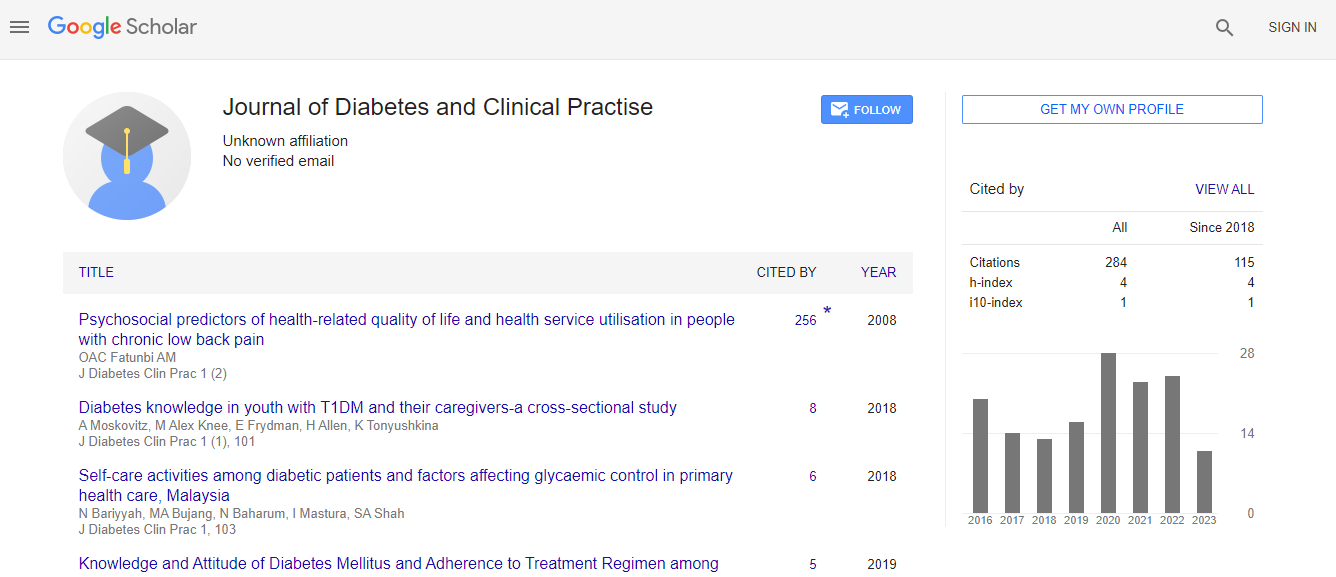Knowledge and Attitude of Diabetes Mellitus and Adherence to Treatment Regimen among Diabetic Patients Attending Kirehe District Hospital, Rwanda
*Corresponding Author: Habtu M, Department of Public Health, Mount Kenya University, School Of Health Sciences, Kigali Campus, Rwanda, Tel: +250784460645, Email: mikel.habtu@gmail.comReceived Date: Apr 11, 2019 / Accepted Date: Apr 23, 2019 / Published Date: Apr 30, 2019
Citation: Habtu M, Uwingabire S, Mureithi C, Gashegu M (2019) Knowledge and Attitude of Diabetes Mellitus and Adherence to Treatment Regimen among Diabetic Patients Attending Kirehe District Hospital, Rwanda.
Copyright: © 2019 Habtu M, et al. This is an open-access article distributed under the terms of the Creative Commons Attribution License, which permits unrestricted use, distribution, and reproduction in any medium, provided the original author and source are credited.
Abstract
Background: Chronic diseases such as diabetes mellitus require daily self-management and long term therapies. Non-adherence to diabetic treatment has been shown to contribute to poor glycemic control leading to development of complications, repeated hospital admissions, amputations and even death. Despite high readmission rates with complication in Rwanda, there is limited data on the adherence to medication among diabetic patients.
Objectives: To determine the knowledge and attitude of diabetes mellitus and adherence to treatment regimen among diabetic patients attending Kirehe District Hospital, Rwanda.
Methods: A descriptive cross-sectional study was carried out. A systematic sampling method was used to recruit 127 diabetic patients. Data was collected using pretested semi structured questionnaire. Score assessment was used to assess knowledge and attitude level towards treatment and prevention of diabetes mellitus and adherence to treatment regimen. Factors associated with adherence were considered statistically significant at P ≤ 0.05 and multivariate analysis for statistically significant variables in bivariate analysis was performed.
Results: The finding revealed that 42.5% of the respondents had good knowledge. Similarly, respondents with good attitude towards diabetes risk factors, treatment and prevention was 44.1%. However, majority of the respondents (64.6%) had adequate adherence towards treatment regimen. The predictors of adequate adherence were older age (AOR=51.98; 95%CI=7.82-345.71, p<0.001), attaining primary school (AOR=12.64; 95%CI=2.00-79.95, p=0.007), attaining secondary or university (AOR=53.54; 95%CI=5.98-479.37, p<0.001) and good knowledge (AOR=10.60; 95%CI=1.55-72.32, p=0.016).
Conclusion: The levels of knowledge and attitude towards diabetes mellitus were low. Therefore, the Ministry of Health and other related stakeholders should help increase the awareness and enhance positive attitude among diabetes mellitus patients through education programs. More focus should be given to illiterate and young age group.

 Spanish
Spanish  Chinese
Chinese  Russian
Russian  German
German  French
French  Japanese
Japanese  Portuguese
Portuguese  Hindi
Hindi 
